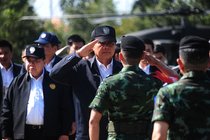Thai Government Blocks Briefing on Torture in Thailand

Thai Government Blocks Briefing on Torture in Thailand
International rights group Amnesty International canceled their briefing in Bangkok after threats that the briefing would violate Thai labor laws. The briefing was for a report by the Amnesty International accusing the Thai military junta, which came into rule by a coup in 2014, of torture and abuse by its police and military. The report is based on many interviews from victims and associated lawyers and family members. This is not the first time the Thai military junta has pressured human rights groups to cancel briefings; the NY Times reports it has happened twice before. It also reports that the report in question corroborates findings by the UN Committee Against Torture.
This article raises concerns about the modern Thai government. What are the historical factors that led to martial rule? It is mentioned that the Thai government “brought stability to a deeply polarized nation;” I’m interested in how exactly did military rule stabilized the nation, or if it truly did at all. I wonder if this stability is really repression, as the article names “political opponents, migrant workers, suspected insurgents and others” as the victims of the alleged abuse. I see ties back to the readings we have done in class regarding the ethnic diversity in Thailand and the role of political systems in shaping the minority experience. In grappling with ethnic diversity, does the modern Thai government use repressive tactics to create a unified nation?
Read more here: http://www.nytimes.com/2016/09/29/world/asia/thailand-amnesty-torture-re...
A related article linked in this one, about stopping a briefing on Vietnam torture in Bangkok (with a more overtly condemning tone toward the Thai government): http://www.voanews.com/a/thailand-halts-briefing-on-vietnam-rights-abuse...